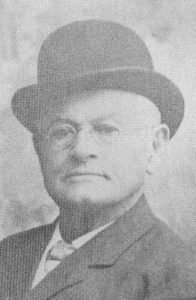Robert Reed Church Sr.

Robert Reed Church, Sr., was a millionaire business leader. He was also a philanthropist in Memphis, Tennessee.
Church was born in Holly Springs, Mississippi on June 18, 1839, a product of an interracial union to father Charles B. Church, and his mother, Emmeline, who was an enslaved seamstress who died when Robert was 12 years old.
Employed as a cabin boy and a steward and surviving a near fatal steamboat sinking in 1855, Church in 1862 was forced to be a cabin steward on a Union steamer during the Civil War.
Church married Louisa Ayres, also a former slave, in 1862. They had one child, Mary Eliza, who became a prominent civil rights and women’s rights advocate.
Church’s marriage to Ayres ended in divorce. He then married Anna Wright in 1885 and they had Robert, Jr. who followed his father into business and politics.
In 1865 Church and Ayres settled in Memphis where they both became entrepreneurs. Ayres, according to reports, opened a string of beauty parlors while Church acquired a saloon and added to his holdings over the years, eventually owning a restaurant and a downtown hotel. During the Memphis Race Riot of 1866, a white mob attacked Church’s saloon, shot him and left him for dead. Church recovered and vowed to remain in Memphis despite the anti-black violence. He stayed during the Yellow Fever Epidemic of 1878 and afterwards bought considerable real estates.
In 1906, Church, influenced by Booker T. Washington’s National Negro Business League, founded the Solvent Savings Bank and Trust Company, the first black bank in Memphis since the collapse of the Freedman’s Savings and Trust Company Bank, Memphis Branch, in 1874.
In 1893 he purchased the first municipal bond issued by the City of Memphis after its bankruptcy in 1879. In 1908 he paid off creditors to prevent them from seizing Beale Street Baptist Church.
Robert Reed Church, Sr. died in Memphis in 1912 at the age of 73.









